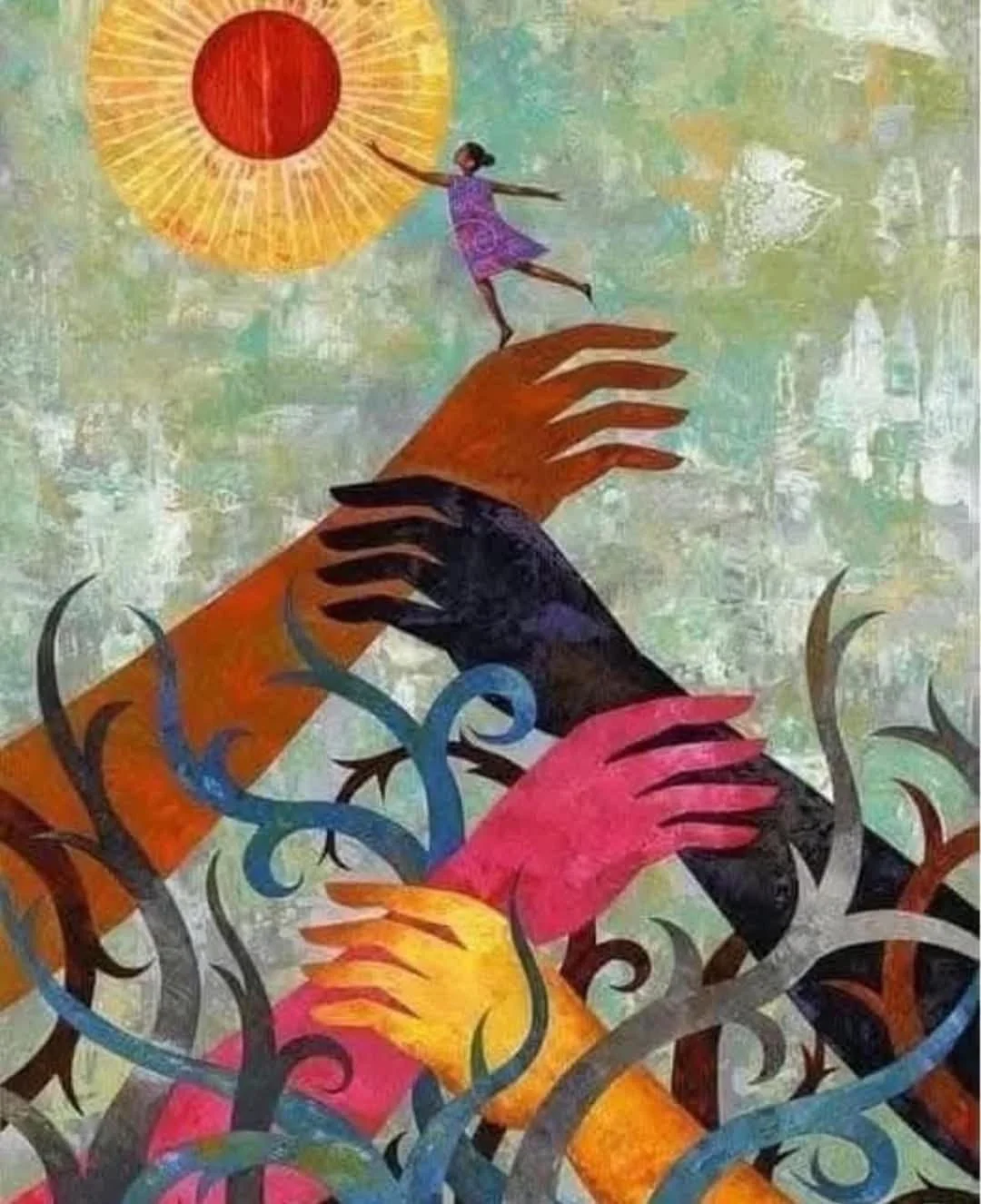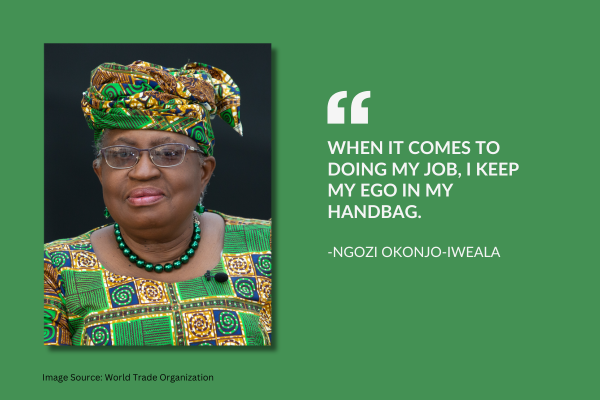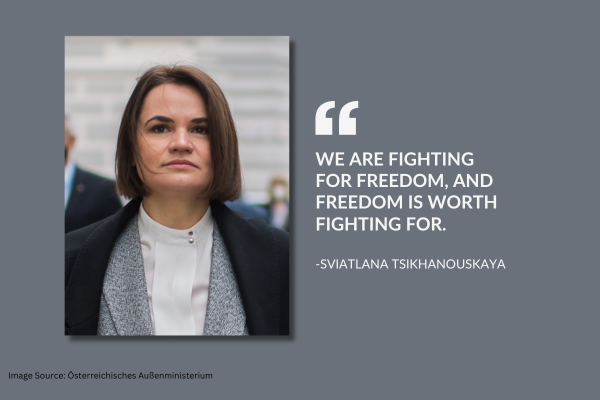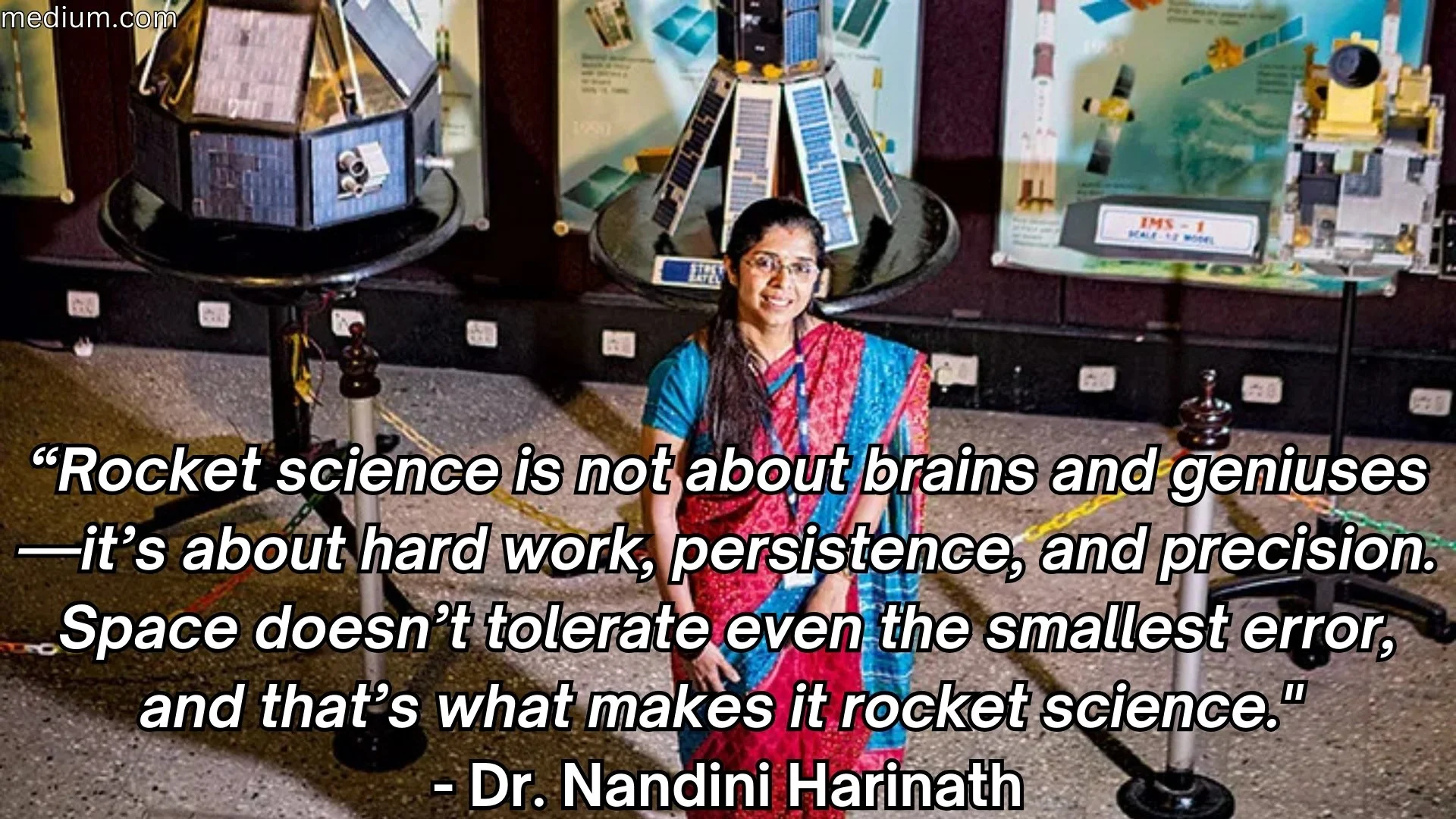When Women Rise, We All Rise
Stories of Strength, Solidarity & Change
What happens when women refuse to be silent? When they lead, challenge, and build? Change happens—not just for them, but for all of us.
Throughout February, we’ve explored the stories of incredible women making an impact in different ways—fighting for human rights, standing up for self-trust, and breaking barriers in STEM. This week, we’re zooming out to look at the bigger picture: the global movement of women lifting each other up.
Here are four women who are changing the game—each in their own way, from politics to sports to innovation:
🌍 Ngozi Okonjo-Iweala
Trailblazing Leader: In March 2021, Ngozi Okonjo-Iweala became the first woman and the first African to serve as the Director-General of the World Trade Organization (WTO).
Economic Reformer: As Nigeria's Finance Minister, she implemented significant economic reforms, including efforts to increase transparency and reduce corruption.
Global Recognition: She has been listed among Forbes'"100 Most Powerful Women" multiple times, reflecting her influence in global economics and development.
🗳 Sviatlana Tsikhanouskaya
Accidental Politician: Originally an English teacher and translator, Sviatlana entered politics in 2020 after her husband, a presidential candidate, was arrested.
Symbol of Resistance: Despite threats, she united opposition forces in Belarus, leading a significant movement challenging long-time President Alexander Lukashenko.
International Advocate: Living in exile, she continues to advocate for democratic reforms in Belarus, meeting with global leaders to garner support.
📹 Anjali Sud
Young CEO: Anjali Sud became the CEO of Vimeo in 2017 at the age of 34, steering the company towards empowering creators with high-quality video tools.
Innovative Strategist: Under her leadership, Vimeo shifted from a streaming platform to a software company, focusing on providing video solutions to businesses and individuals.
Recognized Leader: She has been featured in Fortune's"40 Under 40" list, highlighting her impact in the technology and media sectors. She’s currently the CEO of the entertainment platform Tubi.
🥊 Mary Kom
Boxing Legend: Mary Kom is a six-time world boxing champion and the only woman boxer to have won a medal in each of the first seven World Championships.
Olympic Medalist: She secured a bronze medal in the2012 London Olympics, making history as the only Indian female boxer to achieve this feat.
Parliamentarian: Beyond the ring, she has served as a Member of Parliament in the Rajya Sabha, contributing to sports and youth affairs in India.
Each of these women has faced barriers. Each of them has pushed forward anyway. And because of them, the world is changing.
She Asked ‘Why?’—And Changed the World
From Curiosity to Discovery:
Women in STEM Changing the World
February 11 marked International Day of Women and Girls in Science, a day to celebrate women’s contributions to STEM while recognizing the gender gap that still persists. Despite progress, women remain underrepresented in scientific fields, making up only 33% of researchers globally. The message is clear: we need more girls in STEM.
💡 That’s why I created the STEM Starter Pack – a free resource packed with online coding courses, inspiring science podcasts, and scholarship opportunities to support the next generation of women in STEM.
🔗 Download the STEM Starter Pack Here
📖 Fun fact: The first computer programmer was a woman! In the 1840s, Ada Lovelace envisioned the concept of algorithms, laying the foundation for modern computing. Today, we continue to build on the legacy of women like her.
Brilliant Minds, Bold Futures
Science is about discovery, but it’s also about curiosity, persistence, and breaking new ground—just like these five incredible women. Their work has saved lives, sent rockets to Mars, uncovered nature’s secrets, and opened new doors to space.
Meet five STEM pioneers changing our world:
1. 🔬 Dr. Françoise Barré-Sinoussi (France) – The Woman Who Helped Unravel HIV/AIDS
Imagine being a 13-year-old girl reading about Marie Curie and deciding that one day, you too would be a scientist. That was Dr. Françoise Barré-Sinoussi. Decades later, she co-discovered HIV in 1983, a groundbreaking achievement that led to life-saving treatments and earned her the 2008 Nobel Prize in Medicine. But her work didn’t stop in the lab—she became a fierce advocate for global health, fighting to ensure HIV treatments reach the people who need them most.
2. 🌊 Dr. Márcia Barbosa (Brazil) – Cracking the Mysteries of Water
Water is everywhere, but did you know it has over 70 unusual properties? Brazilian physicist Dr. Márcia Barbosa has spent her career uncovering these secrets, leading to breakthroughs in medicine, climate science, and energy. But she’s not just solving scientific mysteries—she’s also breaking down barriers for women in physics, proving that science belongs to everyone.
⚽ Fun Fact: As a child, she learned complex math by analyzing soccer stats!
3. 🚀 Dr. Kellie Gerardi (United States) – The Future Astronaut Bringing Space to Everyone
You might know her from TikTok, but Dr. Kellie Gerardi is far more than a social media star. As a bioastronautics researcher and commercial astronaut, she’s testing cutting-edge technologies for future space missions. Soon, she’ll be heading back to space, set to lead an all-female suborbital mission, proving that space isn’t just for NASA—it’s for dreamers everywhere.
📖 Fun Fact: She wrote her first book while training for spaceflight!
4. 🔴 Dr. Nandini Harinath (India) – The Engineer Behind India’s Mars Mission
As a child, Dr. Nandini Harinath was fascinated by Star Trek. With a math teacher for a mother and an engineer for a father, science and sci-fi were a big part of her family life—sparking a passion that led to a career in space engineering. In 2014, she was part of the team that launched India’s first Mars orbiter, making history and proving that interplanetary dreams are achievable. Over the years, she has worked on 14 space missions, and she continues to inspire young women to explore STEM careers.
🎬 Fun Fact: India’s Mars mission cost less than a Hollywood movie—now that’s smart engineering!
5. 🌿 Dr. Tu Youyou (China) – The Scientist Who Beat Malaria
When Dr. Tu Youyou was 16, she fell seriously ill with tuberculosis and had to put her studies on hold for two years. It was a tough time, but it also sparked something in her—a deep desire to help find cures for diseases that change people’s lives. And that’s exactly what she set out to do. By blending ancient Chinese medicine with modern science, she discovered artemisinin, a treatment that has saved millions of lives from malaria. In 2015, she became the first Chinese woman to win a Nobel Prize in Medicine, proving that sometimes, the biggest answers come from unexpected places.
👉 Which of these pioneers inspires you the most? Let’s celebrate the women who are shaping the future of science! 💙
The Deepest Love Begins With You ❤️
The Most Important Love of All
❤️ February 14 is Valentine’s Day—a celebration of love in all its forms. But here’s a truth we don’t always hear: the love that matters most is the one we cultivate for ourselves.
Bodily Autonomy: The Power of Self-Trust
February often centers on romance, but what if we turned that love inward? What if, instead of waiting for permission, we trusted ourselves—our voices, our needs, our choices?
Self-trust isn’t just about bubble baths and affirmations. It’s about knowing, deep in your bones, that your body belongs to you. No one—not society, not institutions, not even those who love us—should have more say over our well-being than we do.
Yet, studies continue to show a troubling reality: when it comes to healthcare, women’s concerns are often dismissed. A 2024 study from the Journal of Women's Health found that women experiencing heart attack symptoms wait, on average, 65 minutes longer than men for emergency care. That’s not just a delay—it’s a life-threatening disparity.
But the tide is turning. More women are demanding to be heard, rewriting the rules of healthcare advocacy. As a leading women’s health advocate puts it:
"When I stopped mistaking intuition for anxiety and trusted it as expertise, everything changed. It’s not just about being heard—it’s about knowing we deserve to be."
How to Build Self-Trust in Your Health Journey
✅ Use power phrases: If a doctor dismisses your concerns, try: "Can you document this in my records?" or "I’d like to understand your reasoning for this diagnosis."
✅ Build a "Health Champions Circle": Surround yourself with providers who respect your autonomy and empower you with knowledge.
✅ Listen to your gut: If something feels off—whether it’s a medical decision, a boundary, or the need for rest—honor it.
What’s one way you can practice self-trust today? Maybe it’s finally saying no when you mean it, setting a boundary without guilt, or resting without apology.
"If you don’t trust yourself, you’ll always be looking for someone else to tell you who you are." —Glennon Doyle
Dr. Tlaleng Mofokeng and the Fight for Bodily Autonomy
Dr. Tlaleng Mofokeng is a fierce advocate for bodily autonomy. As a South African doctor, author, and United Nations Special Rapporteur on the Right to Health, she has spent her career fighting for reproductive rights, accessible healthcare, and the right of every woman—especially those in marginalized communities—to make informed decisions about her own body.
Her work goes beyond healthcare—it’s about self-governance, dignity, and freedom. From pushing for comprehensive sex education to challenging harmful policies, Dr. Mofokeng reminds us that bodily autonomy is a fundamental human right.
Her book, Dr. T: A Guide to Sexual Health and Pleasure, is a must-read for anyone reclaiming their voice and choices. It dismantles outdated taboos, encourages open conversations about sexual health, and reminds us that trusting our own bodies is an act of power.
How We Can Carry This Work Forward
✅ Start the conversation: Talk about women’s health with friends, daughters, and communities. Knowledge is power.
✅ Support women's healthcare rights: Advocate for policies that protect reproductive freedom and accessible healthcare.
✅ Trust yourself: Your body. Your choices. Your voice. Self-trust is the first step toward self-advocacy.
What Jealousy and Envy Are Trying to Tell You
Self-trust doesn’t just apply to our bodies—it also applies to our emotions.
Comparison sneaks up when we least expect it—scrolling social media, hearing about someone’s success, watching another woman carry herself with the confidence we crave. Suddenly, jealousy and envy take over, making us feel like we’re behind.
But instead of pushing those feelings away, what if we listened to them?
🔹 Jealousy says: I’m afraid of losing something that matters to me. It highlights insecurities we haven’t fully faced.
🔹 Envy says: I want that too. It reveals our desires—more self-trust, more freedom, the courage to set boundaries.
Dr. Mofokeng’s work reminds us that bodily autonomy starts with self-trust. The same is true for emotional autonomy. Instead of resenting what others have, ask:
👉 What is this feeling trying to tell me?
👉 What part of this do I want for myself?
Turning Comparison into Clarity
✅ Pause and reflect: Is this jealousy or envy? What is it revealing about you?
✅ Shift the story: Instead of "She has what I don’t, "try "She’s showing me what’s possible."
✅ Turn admiration into action: If you envy someone’s self-trust, how can you build your own?
Next time comparison creeps in, don’t let it steal your joy—let it guide you forward.
A Global Stand Against Female Genital Mutilation
Why This Day Matters: Breaking the Silence on FGM
A 10-year-old girl in Kenya doesn’t know February 6 is the International Day of Zero Tolerance for Female Genital Mutilation. But she knows fear. She knows pain. She knows silence.
Today, we break that silence.
FGM is a brutal violation of human rights that continues to harm millions of girls and women worldwide. Over 200 million women have endured FGM, and 3 million more girls remain at risk every year. Despite efforts, this practice still persists in many communities.
But here’s what doesn’t get shared enough: Change is happening.
More women are breaking their silence. More communities are saying no. Survivors and activists are leading grassroots movements, dismantling harmful traditions, and shifting mindsets. Today, we recognize their courage—and we stand with them in pushing forward.
🎥 Watch: Why FGM Must End – A Global Call to Action
See the full story and why urgent action is needed.
Dr. Nafissatou Diop: Ending FGM, Empowering Girls
Some women change lives. Others change the world. Dr. Nafissatou Diop is doing both.
For decades, she has led the fight against FGM, reshaping policies and cultural norms. As the former coordinator of the UNFPA-UNICEF Joint Programme on FGM, she worked with local leaders, former practitioners, and survivors to create lasting change.
"We don’t just tell people to stop.
We help them understand why stopping matters.
We listen, we educate, we build trust."
Because of her work, thousands of villages across 20+ countries have abandoned FGM. More girls are now able to say “No”—and be heard.
👩🏾⚕️ On this Zero Tolerance Day, we honor Dr. Diop and the millions of girls reclaiming their futures.
🎥 Watch: A Survivor's Journey – Leyla Hussein’s Story
Witness how one woman turned pain into activism.
The Fight to Heal: Restoring Hope
For many women, the damage caused by FGM is not just emotional—it’s physical. But there is hope.
Dr. Ghada Hatem, a French gynecologist, has helped thousands of women recover from the trauma of FGM through reconstructive surgery. At her women’s shelter in Saint-Denis, Paris, she provides medical care and emotional support to survivors who never thought healing was possible.
🎥 Watch: A Doctor’s Mission to Restore Dignity
Meet the doctor giving survivors a second chance at reclaiming their bodies.
Voices of Change: Jaha’s Story
One woman. One voice. A movement that cannot be ignored.
Jaha Dukureh was just a baby when she was subjected to FGM in The Gambia. By 15, she was forced into marriage. But instead of letting her past define her, Jaha chose to fight back. She became a global advocate, working to ban FGM in The Gambia and beyond.
Her story is a testament to the power of one woman’s voice to ignite change.
🎥 Watch: The Fight to End FGM – Jaha’s Mission
Follow her emotional and powerful journey as she takes on deeply rooted traditions.
















